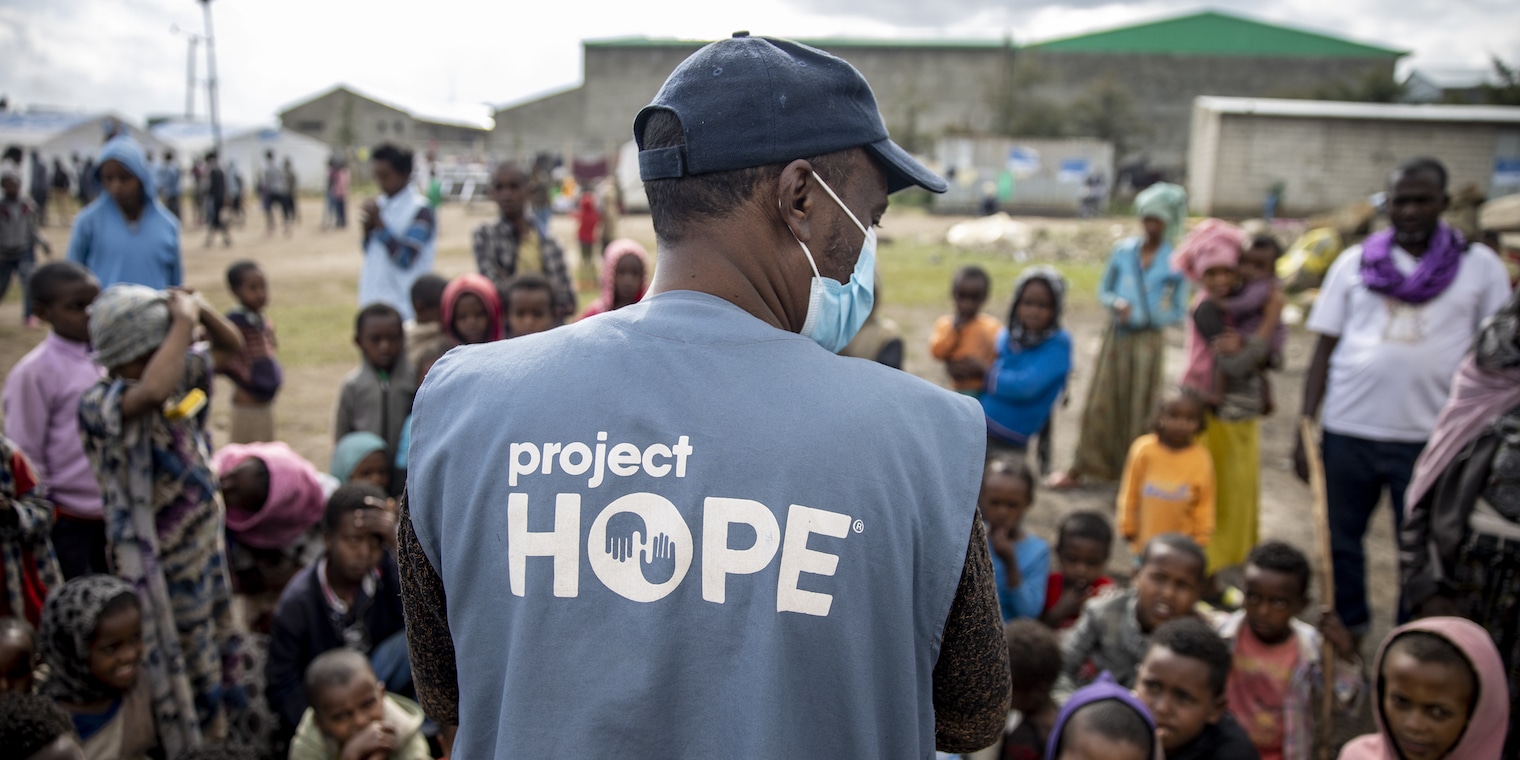
Health for Refugees & Displaced Populations
Around the world, Project HOPE helps improve access to health and social services for families forced to flee from home.
Conflict, violence, and persecution have led to the largest global displacement crisis in history. Millions of families have been forced to leave home in search of safety, which often comes at the steep cost of their health.
From hospitals in Ukraine to internal displacement camps inside Ethiopia, Project HOPE is scaling up work to protect the health and well-being of refugees, internally displaced people, and asylum seekers worldwide.
A Global Displacement Crisis
More than 108 million people are forcibly displaced by conflict, violence, persecution, and human rights violations worldwide. That’s more than the entire populations of Colombia and Kenya combined, or 1 in every 74 people around the globe.
Recent crises and resurgences in longstanding conflict have led to the highest level of displacement in recorded history — a number more than double what it was 10 years ago. Russia’s 2022 invasion of Ukraine alone displaced 14 million people in a matter of months, the fastest and largest displacement crisis in Europe since World War II, which underscores the scale of the emergency and the urgent need for support.
Most people who are forced to flee home remain displaced within their own countries. In 2022, war in Ukraine and conflicts in the Democratic Republic of the Congo, Ethiopia, and Myanmar each internally displaced more than 1 million people.
For many refugees and IDPs around the world, the prospect of returning home is far out of reach. The average length of time they can expect to be displaced is increasing, with many spending years and sometimes decades away from home, grappling with a future unknown. These families often have limited to no access to health services, and few opportunities for work.
The hardships endured by displaced populations are further exacerbated by the climate crisis, inflation, and food shortages. It’s estimated that more than 300 million people living in conflict settings experienced acute food insecurity in 2021.
Since 2008, an average of 21.5 million people have been uprooted by climate change each year — and 80% of them are women. This number will only increase as the climate crisis accelerates: It’s projected as many as 216 million people could become internal climate migrants by 2050.
The scale of forced displacement — and the rate at which it’s rising — is outpacing available services and solutions. Until displaced populations have access to basic needs and rights, including health care, we cannot achieve the promise of the 2030 Agenda for Sustainable Development to “leave no one behind.”
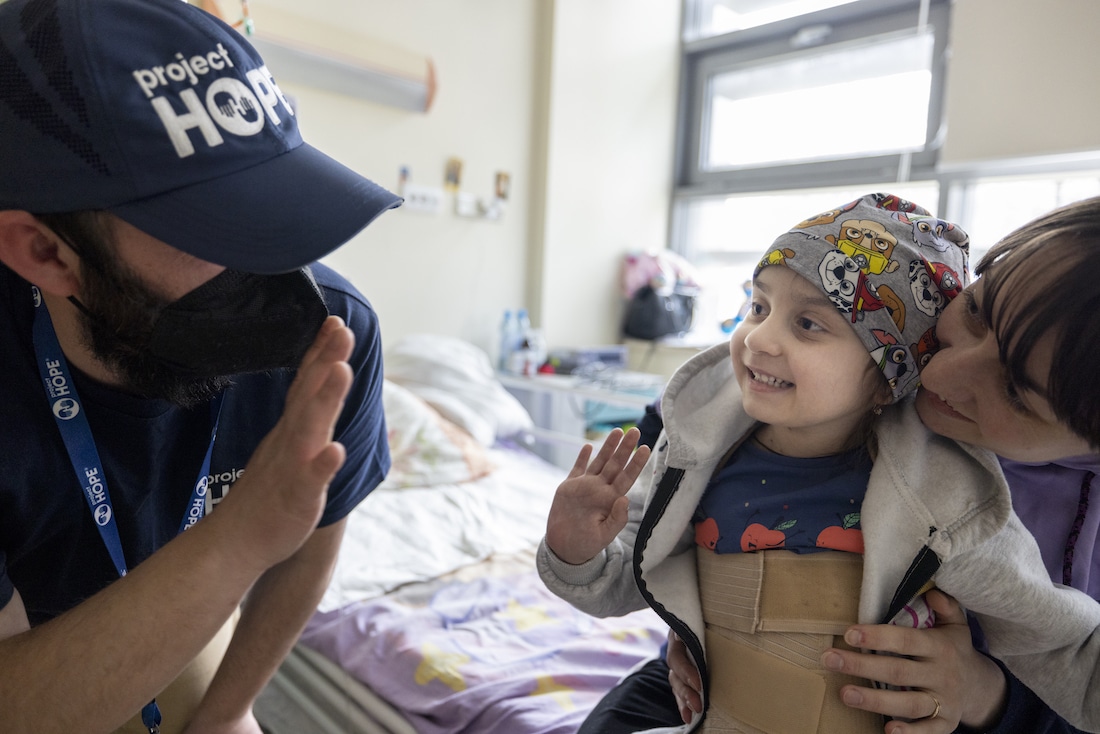
How Does Displacement Impact Health?
The health and safety issues facing refugees and internally displaced people are wide-ranging and complex, and access to care can be difficult to impossible. In short, the result is poorer health outcomes.
The threat of chronic diseases
Noncommunicable diseases like cancer and diabetes are becoming the most serious health threats to people who have been forcibly displaced.
Chronic diseases are the world’s number one killer, and the burden of NCDs in the top refugee countries of origin tells the story: NCDs account for 63% of the health burden in Myanmar, 51% in Sudan, and 43% in Afghanistan. Most refugees do not live in camps; they live in cities: a 2019 study of Syrian refugees in Jordan found that more than 1 in 10 experienced hypertension, with other issues including cardiovascular disease and diabetes.
Exposure to communicable diseases
Forced migration has long been linked to the spread of infectious disease. The likelihood of contracting diseases like cholera, dengue, and COVID-19 is especially high for those living in crisis settings, particularly in refugee camps, where living conditions are often overcrowded, and water, sanitation, and hygiene practices are often poor.
Endemic diseases such as acute respiratory infections, measles, and malaria present the greatest burden to forcibly displaced populations. A 20-year study of outbreaks among forcibly displaced populations found that nearly half of all infectious diseases could have been prevented with vaccination, underlining the critical need for adequate immunization services.
Maternal health
It is difficult to determine how many pregnant women are among the tens of millions of women who have been displaced, but studies report numbers ranging from 9% in some contexts to 11% in others. That means that millions of women are facing the reality that they will have to deliver their child away from home, either in another country or on the move. The vast majority of them will have to do it without prenatal or antenatal care and outside formal health facilities or without a skilled attendant present, greatly increasing the risk of complication.
Tragically, maternal mortality rates among refugees are several times higher than the general global population, with one study finding that 15% of refugee women will experience life-threatening complications. For too many women who have been displaced, giving birth becomes a most dangerous undertaking — a life-or-death event.
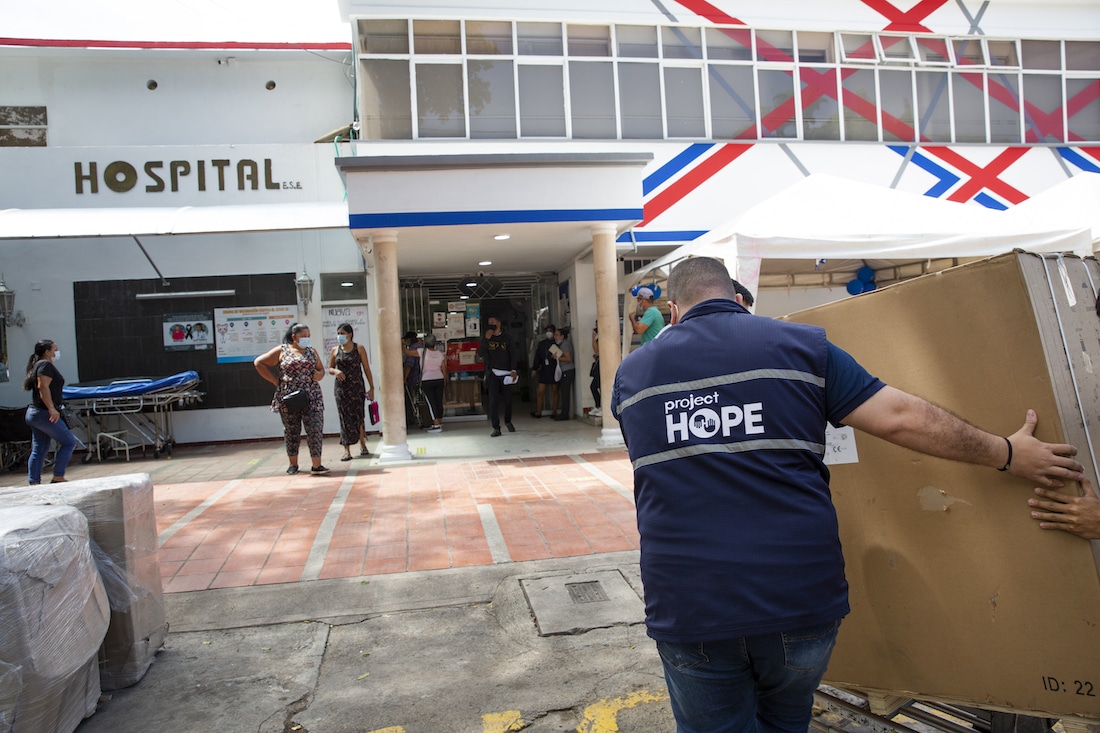
Mental health
Exposure to war, conflict, and disaster can have a serious and lifelong effect on mental health — especially for children forced to flee home and start over somewhere new.
Depression, anxiety, post-traumatic stress disorder, and other common mental health disorders are highly prevalent among refugee and migrant populations. As many as 15 million Ukrainians say they feel the impact of the war on their psycho-emotional state, and the prevalence of PTSD among the Ukrainian population is as high as 30%.
The number of refugees who are able to receive mental health treatment vastly underrepresents the need. In 2018, mental health consultations accounted for less than 2% of refugee health consultations.
>> Read: In A Crisis, The Deepest Scars Can’t Be Seen
Gender-based violence
In times of crisis, displaced women and girls are at heightened risk of multiple forms of gender-based violence, especially those who take unofficial border crossings or travel alone. COVID-19 only exacerbated the risk, limiting access to critical support for survivors.
In Ukraine, one study found that displaced women in the eastern region were three times more likely to experience GBV than local residents. In South America, sexual violence has become so common among women fleeing Venezuela that some report taking contraceptives before starting their journey in order to prevent pregnancy in case of rape or sexual trafficking.
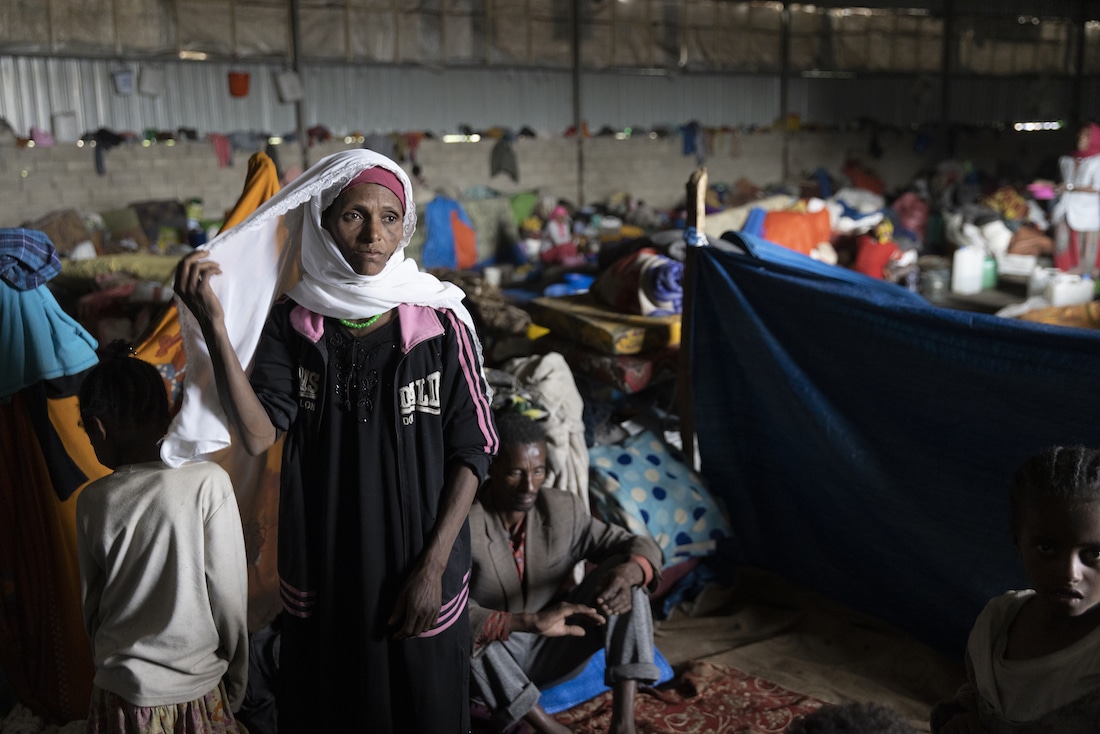
Project HOPE’s Impact
Project HOPE helps refugees, IDPs, and asylum seekers access the health services they need to protect themselves and their families — whether on the move, settling in to temporary camps or shelters, or starting over in host communities. Our approach focuses on the following areas:
Maternal and child health care
We work to ensure women have access to care throughout pregnancy, during delivery, and in the months after childbirth. We also focus on ensuring children have the nourishment and medical attention they need to grow healthy and strong.
> Photos: The Journey Venezuela’s Mothers Endure
Mobile health and nutrition
We improve access to essential health and nutrition support in places where people have lost access to their health facilities, including inside Ukraine, Ethiopia, and other locations experiencing conflict.
> On The Ground: The Day The Health Workers Returned
Mental health, psychosocial support, and protection
We prioritize mental health services for refugees, IDPs, and asylum seekers, working with local partners to help people cope with the trauma and grief of conflict and crisis.
This includes training local health workers to provide mental health and psychosocial support and building safe spaces where children and adults can find various resources to help them recover their sense of belonging and adapt to new circumstances. We also provide services specifically tailored to empower women and girls and employ psychologists who support survivors of gender-based violence.
> The Ukrainian Refugee Psychologists of Krakow
> In Poland, Ukrainians Find A Safe Space
Training health care workers
We ensure health workers have the tools and training they need to be able to meet the unique health needs of those who are displaced in their communities.
> Our Work: Training Health Care Workers
Water, sanitation, and hygiene
We deliver emergency drinking water and provide equipment and supplies like washing and drying machines, cleaning trolleys, and waste buckets. We also train medical staff on infection and prevention control, WASH concepts, and proper protocols for using equipment.
> In Kherson, ‘Water Is Worth Its Weight in Gold’
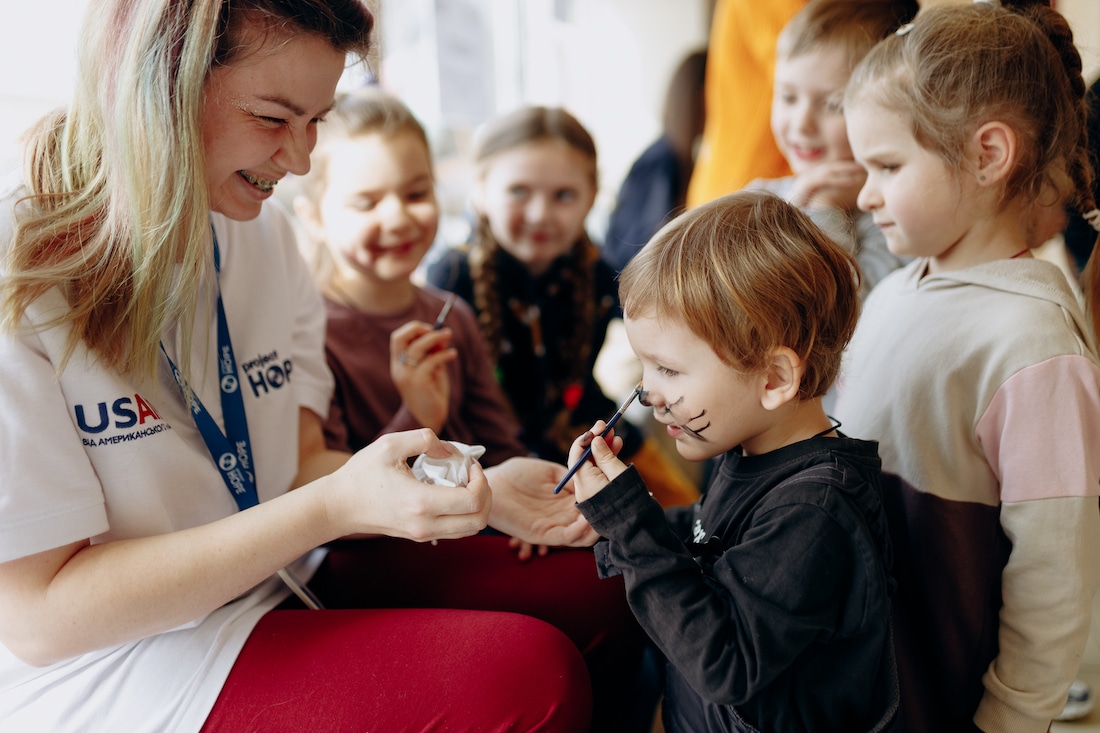
Our Recent Responses
Supporting displaced communities in and outside of Ukraine
Project HOPE is working urgently to meet the health needs of displaced Ukrainians, both in and outside the country. Our teams on the ground are actively delivering medicines, medical supplies, and mental health support; launching mobile medical units to provide primary care in hard-hit areas; rebuilding damaged hospitals and clinics; and providing other urgent assistance. In Ukraine, Project HOPE has established psychosocial support centers where we hold group and individual consultations, workshops, art therapy, and educational activities for both children and adults. To support internally displaced women looking to re-enter the job market, Project HOPE team members also help with job searches and host job interview workshops.
In Poland and Moldova, we work with partners to operate safe spaces that provide care for refugees’ mental health and well-being, particularly women and children. This includes training health workers, social workers, and volunteers on how to support the mental health and well-being of the Ukrainian refugee families they work with.
Connecting Venezuelan refugees and migrants to essential care
More than 1.8 million Venezuelans have sought refuge in Colombia, many of whom are pregnant women and mothers in need of health care. Project HOPE is working inside hospitals and clinics near the border to help health workers meet the rise in need and provide essential maternal care for women before, during, and after delivery. For many Venezuelan women, this is the only care they have received amid the stresses and unknowns of displacement. We’re also providing vital medicines, equipment, and medical supplies like radiant infant warmers, fetal dopplers, and cribs.
Providing emergency relief for displaced communities in Ethiopia
In Ethiopia, severe drought and ongoing conflict in the northern Tigray region have displaced more than 2.4 million people, destroyed hospitals and health clinics, and left as many as 7.5 million people facing severe food insecurity. Project HOPE deployed mobile health and nutrition teams to provide essential medicines, vaccines, medical supplies, and ready-to-use therapeutic foods (RUTF) to conflict-affected populations, with a focus on supporting women, children, and people living with or affected by HIV.
We implement a range of relief programs in Ethiopia, focused mostly in northern regions, to improve reproductive, maternal, newborn, and child health and combat the spread of HIV/AIDS.
Helping families find safe shelter along the U.S.-Mexico border
Since the U.S.-Mexico border reopened in 2021, the number of Central American migrants transiting through Mexico to the U.S. has risen dramatically, many of whom are fleeing violence and instability in El Salvador, Guatemala, Honduras, Nicaragua, and Venezuela. Many shelters in Mexico are full and operating beyond capacity. Families who arrive are exhausted and have limited access to health care. In order to better understand the needs and barriers, Project HOPE completed a migrant needs assessment and made recommendations for improving health care.
Read >> The 5,000-Mile Journey
Increasing equitable access to COVID-19 vaccines in the U.S.
The COVID-19 pandemic exposed major vaccination gaps among communities with high proportions of minority groups and individuals who are economically and socially marginalized. Through a program funded by the U.S. Health Resources and Services Administration (HRSA), Project HOPE improved vaccine coverage via free and charitable clinics across five states in the U.S., including two clinics near the U.S.-Mexico border. Thanks to our support, clinics were able to hire bilingual community health workers and expand access to free COVID-19 vaccines at little or no cost. This work helped vaccinate thousands of people in underserved communities, including refugees, migrants, and undocumented persons.
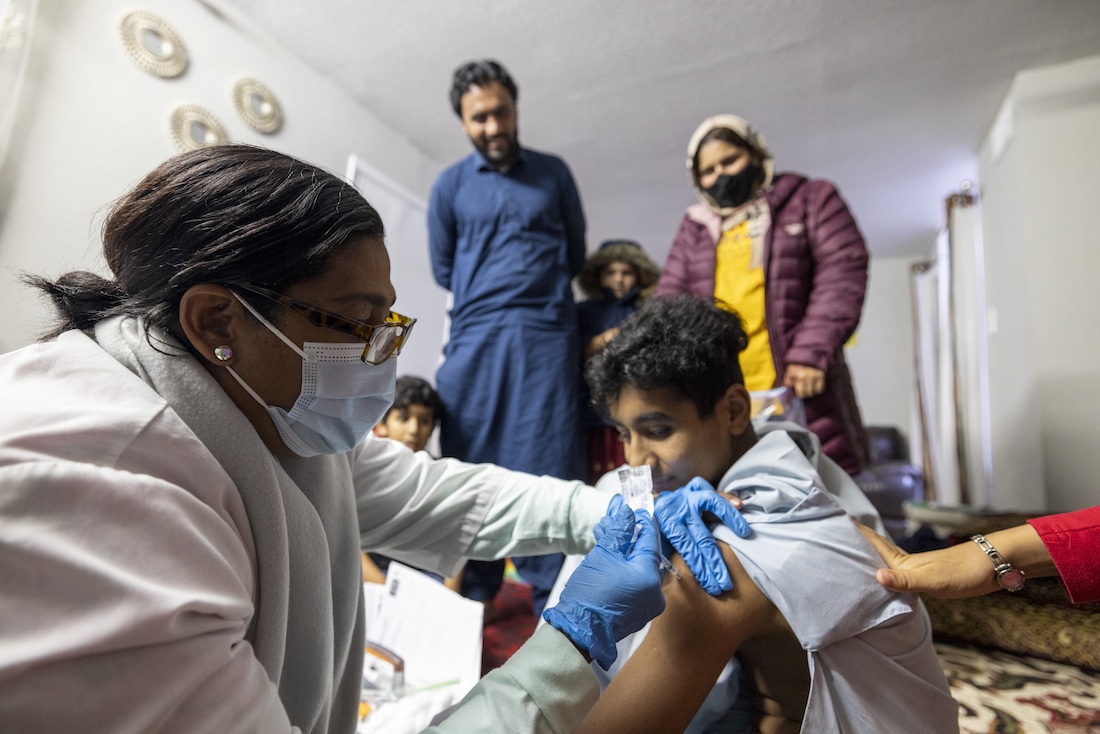
How You Can Help
Make a lifesaving gift to support our work now and for the future at projecthope.org/donate
Are you a health-care or other professional who would like to learn more about volunteering abroad with Project HOPE? Learn more about our volunteer program and join our volunteer roster.
Stay up-to-date on this story and our lifesaving work around the world by following us on Facebook, Instagram, LinkedIn and Twitter, and help spread the word by sharing stories that move and inspire you.